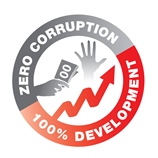UNODC and Corruption
Corruption is a complex social, economic and political phenomenon which affects all countries around the globe. In different contexts, corruption harms democratic institutions, slows economic development and contributes to political instability. Corruption attacks the foundations of democratic institutions by distorting electoral processes, perverting the rule of law and subtracting bureaucracy of its legitimacy. This discourages investment and the creation and development of businesses, which cannot afford the "start-up costs" required because of corruption.
 The concept of corruption is wide, including bribes and kickbacks, fraud, misappropriation of funds or any other diversion of funds by a public agent. Moreover, it can involve cases of nepotism, extortion, trading in influence, use of privileged information for personal purposes and selling of judicial sentences, among other practices.
The concept of corruption is wide, including bribes and kickbacks, fraud, misappropriation of funds or any other diversion of funds by a public agent. Moreover, it can involve cases of nepotism, extortion, trading in influence, use of privileged information for personal purposes and selling of judicial sentences, among other practices.
Recognizing the necessity for a global instrument that could assist the Member States in the fight against corruption, the UN General Assembly approved, in 29th September 2003, the United Nations Convention against Corruption - the first legally binding international anti-corruption instrument. The Convention provides a path for the creation of a global response to the corruption problem.
Acting as the Convention's guardian, UNODC keeps a global program to assist Member States, especially developing countries, to apply the Convention's provisions. To that end, it offers technical assistance directed to both the public and private sectors.
An increasing number of States are acceding and ratifying the United Nations Convention against Corruption, including the countries where the UNODC Liasion and Partnership Office in Brazil acts. One of UNODC's goals in this area is to assist signatory countries in developing the technical capacity required to effectively apply the Convention.
UNODC's main areas of work
Technical Assistance
Projects undertaken in the framework of the Global Programme against Corruption have a specific global logic, leading to the identification of good practices and the production of materials that are not only relevant to one specific country or limited geographic context, but are able to inform policymaking and strategic planning worldwide. The Global Programme functions as a focal point for the UNODC field office network in the development and implementation of anti-corruption projects designed to support Member States in building local capacities in the long run.
Through the Global Programme against Corruption, UNODC supports the Judicial Integrity Group, an association composed of magistrates and judges, in the development of standards and policies to strengthen judicial integrity and capacity. In 2002, the Judicial Integrity Group adopted the Bangalore Principles of Judicial Conduct, which UNODC contributes to implement.
The Global Programme against Corruption supports projects that identify, disseminate and apply good practices in preventing and controlling corruption. To that end, UNODC has produced technical and policy guidelines, such as the Anti-Corruption ToolKit, as well as materials based on county reports and missions. Through these actions, UNODC works to coordinate and facilitate the development of strategies and methodologies for the global fight against corruption.
International Anti-corruption Day
 Campaigns against corruption are frequently promoted by UNODC to be globally disseminated through civil society and governmental networks. The subject is emphasised in the International Anti-corruption Day, celebrated annually on the 9th December, to stress to all people the importance of saying "no" to corruption at all levels. The day chosen marks the signature of the United Nations Convention against Corruption, which took place in the Mexican city of Mérida, in 2003.
Campaigns against corruption are frequently promoted by UNODC to be globally disseminated through civil society and governmental networks. The subject is emphasised in the International Anti-corruption Day, celebrated annually on the 9th December, to stress to all people the importance of saying "no" to corruption at all levels. The day chosen marks the signature of the United Nations Convention against Corruption, which took place in the Mexican city of Mérida, in 2003.
Visit the global website of the campaign
UNODC's Action against Corruption and Economic Crime
Corruption is a complex social, political and economic phenomenon that affects all countries. Corruption undermines democratic institutions, slows economic development and contributes to governmental instability. Corruption attacks the foundation of democratic institutions by distorting electoral processes, perverting the rule of law and creating bureaucratic quagmires whose only reason for existing is the soliciting of bribes. Economic development is stunted because foreign direct investment is discouraged and small businesses within the country often find it impossible to overcome the "start-up costs" required because of corruption.
The United Nations Convention against Corruption is the only legally binding universal anti-corruption instrument. The Convention's far-reaching approach and the mandatory character of many of its provisions make it a unique tool for developing a comprehensive response to a global problem.
The Conference of the States Parties (COSP) is the main policy-making body of the Convention, supporting States parties and signatories in their implementation of the Convention and giving policy guidance to UNODC to develop and implement anti-corruption activities. The actual implementation of the Convention into domestic law by States parties is evaluated through a unique peer-review process, the Implementation Review Mechanism.
To support States parties' efforts to fully implement the Convention, UNODC delivers technical assistance in various corruption-related thematic areas, such as prevention, education, asset recovery, integrity in the criminal justice system, etc.